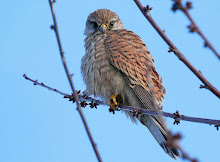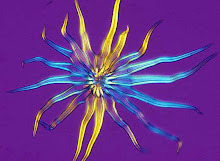Like thousands of others, I was given a Kindle for Christmas. It's a brilliant device, which allows me to accumulate even more books that I probably won't have time to read. Many commentators have suggested that the success of electronic publishing will lead to the demise of the printed book but, to paraphrase Mark Twain's remark when he discovered that a newspaper had published his obituary while he was still alive, reports of the death of the printed book have been greatly exaggerated.
Some have even suggested that electronic publishing might lead to a resurgence in high quality book production for niche markets that electronic books can't reach. Maybe, at the upper end of the market, we'll see the return of books with production values like this one..........
This beautiful art deco cover belongs to a popular book on molluscs by the naturalist Edward Step, published in 1901 when a knowledge of natural history - even when it involved slugs - was very fashionable.
Inside .......
...... each chapter heading is decorated with these delightful drawings.
Until the Second World War many natural history books were published in library editions with covers inlaid with gilt lettering and with embossed images that gave them the tactile qualities that a Kindle can't duplicate. For anyone who likes the feel of a real book, these are rather special. This is Step's book on bees, wasps and ants ....
... and here's his volume on ferns. Step was responsible for writing several of the 'Wayside and Woodland' series which were continually published until the 1960s, long after his death, in less elaborately produced editions.
This is one of my favourites, on toadstools and mushrooms, which contains early and - by modern day standards - crude photographic colour plates ............ but, judging the book by its cover, it's a very appealing example dating from the days when books didn't have an on/off switch.
To find out more about the prolific Edward Step, click here and to download a free digital copy of Shell Life to your Kindle click here.
That's got that off my chest. Now back to all those books that I've accumulated on my Kindle.................
































I don't think books will ever die.
ReplyDeleteThere's something about holding a book, the smell, and everything else, that an electronic imposter will never achieve.
I managed to get a copy of 'Wildlife at Home: How to Study and Photograph It' after reading your post about it the other day. Excellent.
Couldn't agree more Keith. I've always enjoyed being surrounded by books. Glad you got the Keartons' book - true pioneers....
ReplyDeleteTo my surprise I love my Kindle. But I also love my shelves and shelves of natural history books and the Wayside and Woodland are among my favourites.
ReplyDeleteI was sceptical at first John, but I have to admit I'm a convert, not least because of all the free books you can download...
ReplyDeleteOh, the beauty of those books! I don't think I have seen books like that for years. I too have a Kindle but am not very comfortable with it other than it doesn't hurt my wrists if I read a long (heavy) book. Now, you know that I shall immediately download "Shell Life"...
ReplyDeleteIf you've downloaded Shell Life, toffeeapple, make a point of reading the account in slugs chapter of the attraction of Limax maximus to books (p.334 in my copy)....
ReplyDeleteThanks for providing the link to the "Shell Life". I love my kindle and treasure my traditional books. The nice part is that I can have either or both!
ReplyDeleteBeautiful books! Some of them used to have leather covers with embossed lettering. I can still remember the smell of them!Books can never be replaced by any machine.
ReplyDeleteI agree lotusleaf, books can be such beautiful objects...
ReplyDeleteThe best of both worlds Wilma ..... and one of the great things about a Kindle is that we can read rare books from digitised libraries that we could never otherwise have access to without travelling great distances and making special arrangements...
ReplyDeleteMuch as I like having digital books, if only for space saving, I still prefer the real thing. Many digital copies are just scanned and impossible to search easily.
ReplyDeleteThe old hand illustrated book are a treat. Not only were the authors dedicated to their subjects but brilliant artists as well. Apart from the lack of colour the sketches often show more detail than could be seen in a photograph.
Couldn't agree more John - the highly detailed line drawings of British wild flowers produced half a century ago by Stella Ross-Craig are still better identification aids that photographs or paintings of plants. I've also found that old books scanned with word recognition software can produce some pretty haphazard text....
ReplyDeleteMy laptop won't allow me to open the file unfortunately, can't get it to load on Kindle either.
ReplyDeleteThat's a shame toffeeapple - have you tried connecting your Kindle to the laptop with the USB lead and then copying it across to the Kindle using windows explorer....?
ReplyDeleteWhat beautiful illustrations, you have inspired me to get out my pencils and do some designs.
ReplyDeleteI totally agree that the old and the new can go hand-in-hand, we should keep the best of the past while we embrace the best of the future. Cat
Couldn't agree more Cat!
ReplyDeleteNo Phil, I use Chrome, not IE. Might that work?
ReplyDeleteI actually had a kid tell me the other day that books are boring. BORING! Well, maybe they aren't animated and make noises; instead they let the user use his/her OWN imagination rather than relying on the imagination of some computer programmer to make it interesting.
ReplyDeleteI can picture a future, perhaps not too far from now, where book-lovers like us meet secretively in dark, secluded rooms to marvel at and appreciate real, genuine books - books that were meant to be fondled and loved - books that transport the reader to far away places that only the mind can create. These groups will be formed of very select members, who have exceptional intelligence and appreciate the finer things in life.
PS - these are some very lovely volumes you have here. I LOVE turn-of-the-century nature books. There's just something special about them!
ReplyDeleteHi toffeeapple, you could try downloading the PDF file from the web site to your laptop - I think it should be able to read that....or there is an option on the web site to read it online...
ReplyDeleteHi Ellen, One of the other things I like about old natural history books is that their original owners' names are inscribed inside, sometimes with attractive bookplates, sometimes with dedications from whoever gave them as a gift: the human touch. Occasionally the owners annotate them - I've got a Victorian moss flora where the owner has identified all the places where he found various species, in elegant script handwriting in the margins. Old flower books sometimes have pressed leaves and flowers in and on a few occasions I've even found letters inside...there are personal stories of day out in the field within these books, that we can only guess at...
ReplyDelete